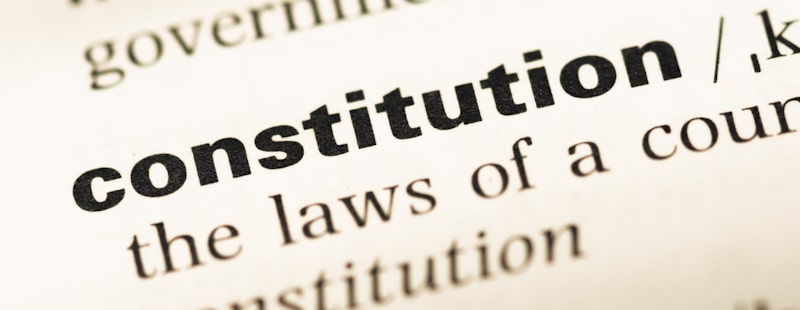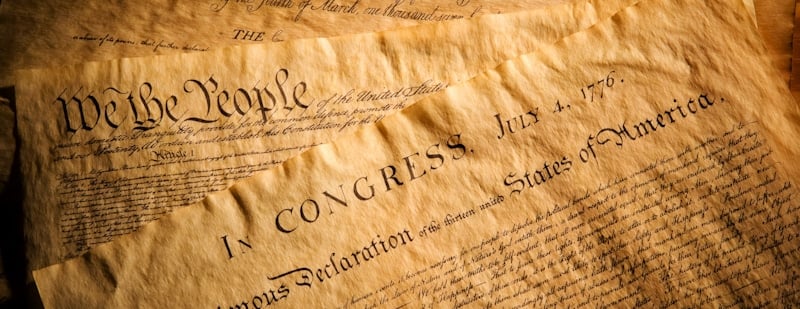There are many confusing words in the English language when it comes to capitalization. One of them is the word “constitution”. It may leave you wondering, “Do you capitalize “constitution”?”
Since “constitution” is an adjective (this is a word that’s used to describe a noun which is defined as a person, place, or thing), it’s written in lowercase. The only time when it’s written with a capital “C” is when you’re referring to a specific founding document (e.g. the American “Constitution”).

Etymology Of The Word “Constitution”
There are three definitions available for the word “constitution”, each with different etymology.
The first definition for “constitution” is a law, regulation, body or rules, edict, or customs. This dates back to the mid fourteenth century. There we find the old French word “constitucion” meaning an establishment. This comes directly from the Latin word “constitution” which is the act of settling, being in a settled condition, being something that’s arranged or settled on, a regulation, order, or an ordinance. It can also be traced back to the past participle (a form of a verb that typically ends in “ed” and is used in forming a passive tense or sometimes an adjective) stem of “constituere.” This word means to resolve, to cause to stand, to set up, set in order, fix, establish, place, or to form something new.
The second definition for the word “constitution” is creation or the act of establishing. This dates back to circa 1400. It was then transformed into a verb meaning “the action of establishing” in circa 1600. Finally, it was in the 1550s when the word “constitution” was used in referring to the body’s physical health, strength, and vigor. Then in the 1580s, it was used to refer to the mind meaning temperament or character.
The third and final definition for the word “constitution” is the one that most people are the most familiar with. It also dates back to circa 1600. Here it is defined as “a mode of organization of a state.” In 1730 it was further explained as a system of basic principles by which a state is governed. It was then in the 1780s that it was used to reference the basic rules and principles of a government that were placed within a written document. Examples of this include the French “constitution” and the American “constitution”. When specifically used to refer to Britain the word “constitution” was used as a collective name for the founding principles that the English people developed and embodied. (Note: The US Constitution was ratified in 1788.)
Understanding Capitalization Rules for the Word “Constitution”
Since the English language always capitalizes the word “constitution” in the phrase “American “constitution”,” there is some confusion as to whether this word should be capitalized when referring to another country’s “constitution”.
One of the first things that’s important to understand here is that the word “constitution” is not a proper noun (a noun that identifies a single entity and is used to refer to it e.g. London). Therefore you shouldn’t capitalize it. However, due to America’s veneration for this institution of the American political system the term has become elevated to the status of a proper noun. This decision has been codified in many American grammar guides. This is not so if you’re writing in UK English though. They’ve chosen not to capitalize these terms (not even the word queen unless it’s being used formally).
Generally speaking, when you are referring to a named document or committee if there’s a common word being used in the official title the word is capitalized. This is also true when the word is being used as a shorthand way of referring to the entity. This isn’t a given though since there are several issues here regarding style and context. For example, it’s considered fairly normal to capitalize “The “constitution” of the United States of America” or “the U.S. “constitution”.” Once that’s been spelled out as such, it’s considered fairly normal to capitalize the word “constitution” throughout the remainder of the document. However, this isn’t something that happens all the time because it depends on both the style and the context.
Rules of Capitalization in the English Language
When you first stop to take a look at them the rules of capitalization in the English language seem simple. You may already realize that you should capitalize proper nouns (names of individual people, places, and things) as well as the first word in each sentence that you write. Where things start to get a bit convoluted is when you start talking about capitalizing the first word of a quote.
Typically you also don’t capitalize a word that comes directly after a colon but there are a few exceptions to this rule. You may also wonder what to do when you’re uncertain as to whether or not something is a proper noun.
Capitalize the First Word of a Sentence
This is easy to remember.
- The dog is asleep.
Capitalize Proper Nouns, Including People’s Names
People’s names should always be capitalized. This is because they are always classified as a proper noun. Included here are names of cities, countries, religions, companies, and political parties. Make sure you also capitalize your relatives’ names when they’re being used in place of their first name.
- Have you met my cat, Felix?
- The weather was beautiful in Northern California last fall when we attended a Hindu wedding there.
- Just wait until Mom sees this. My mom isn’t going to like it one bit.
Usually You Don’t Capitalize Words Following a Colon
Typically, you don’t capitalize a word that follows a colon. However, there are a few exceptions to this rule. The first exception occurs when the word that follows the colon is a proper noun. The second exception to this rule occurs when the words that follow the colon form a complete sentence.
- I have one true passion: horse racing.
- There is only one place that I really want to visit: Pittsburgh, PA.
- There are two reasons why Bob always wears a baseball cap: Sunlight gives him a headache. He also likes the style.
Sometimes You Capitalize the First Word of a Quote
When a quote forms a complete sentence, you capitalize it. However, you should never capitalize the first word of a partial quote.
- Sammy asked, “What’s everyone doing tonight?”
- April said she’s “way too busy” to go to the movies with us this weekend.
Capitalize the Names of Days, Months, and Holidays but Don’t Capitalize the Names of Seasons
Since the names of days, months, and holidays are proper nouns, you’ll want to make sure that you always capitalize them. However, the names of the seasons (summer, fall, winter, spring) are not considered proper nouns. As such, there is no need to capitalize them.
- Saturday is my favorite day of the week.
- Maria’s birthday is in July.
- I can’t believe it’s almost Thanksgiving.
- I hate the winter months.
Capitalize Most Words in a Title
Style guides vary slightly when it comes to whether you should capitalize the title of a book, movie, or other such work. What they do tend to agree on is that you should capitalize the first word and all nouns, verbs (no matter how short they may be), adjectives and proper nouns. With this being said, you should know that you shouldn’t capitalize articles (a, an), conjunctions (a part of speech that connects words, clauses, and phrases), or prepositions (words used to express spatial or temporal relations). However, there are some style guides that do say that you should capitalize any conjunction or preposition that is longer than 5 words.
- Star Trek the Next Generation
Capitalize Names of Cities, Countries, Nationalities, and Languages
You should always capitalize the name of a city, country, nationality, and language because these are all proper nouns.
- English is made up of many languages including Latin.
- My dad is Greek and my mom is German.
- The capital of the United States is Washington D.C.
Sometimes Capitalize Time Periods and Events
When a specific period, era, or historical event has a proper name, make sure you capitalize it. However, when you make mention of a century and the number before it, you shouldn’t capitalize it.
- Most of the veterans from World War I are now deceased.
- England grew into an empire during the sixteenth and seventeenth centuries.
Examples Of The Word “Constitution” In A Sentence
Here are different ways in which the word “”constitution” can be incorporated correctly in a sentence depending of the use given:
- His “constitution” is very strong.
- The people were against the “constitution”.
- The American “constitution” guarantees people equality.
- There are some people who’d love to amend the “constitution”.
- Have you ever read Japan’s “constitution”?
- It was finally time to sign the “constitution”.
- Writing a new “constitution” took four months.
Final Thoughts
Now that you have a proper understanding of when words should and shouldn’t be capitalized, it should be much easier for you to understand when you should and shouldn’t capitalize the word “constitution”.
Shawn Manaher is the founder and CEO of The Content Authority. He’s one part content manager, one part writing ninja organizer, and two parts leader of top content creators. You don’t even want to know what he calls pancakes.



